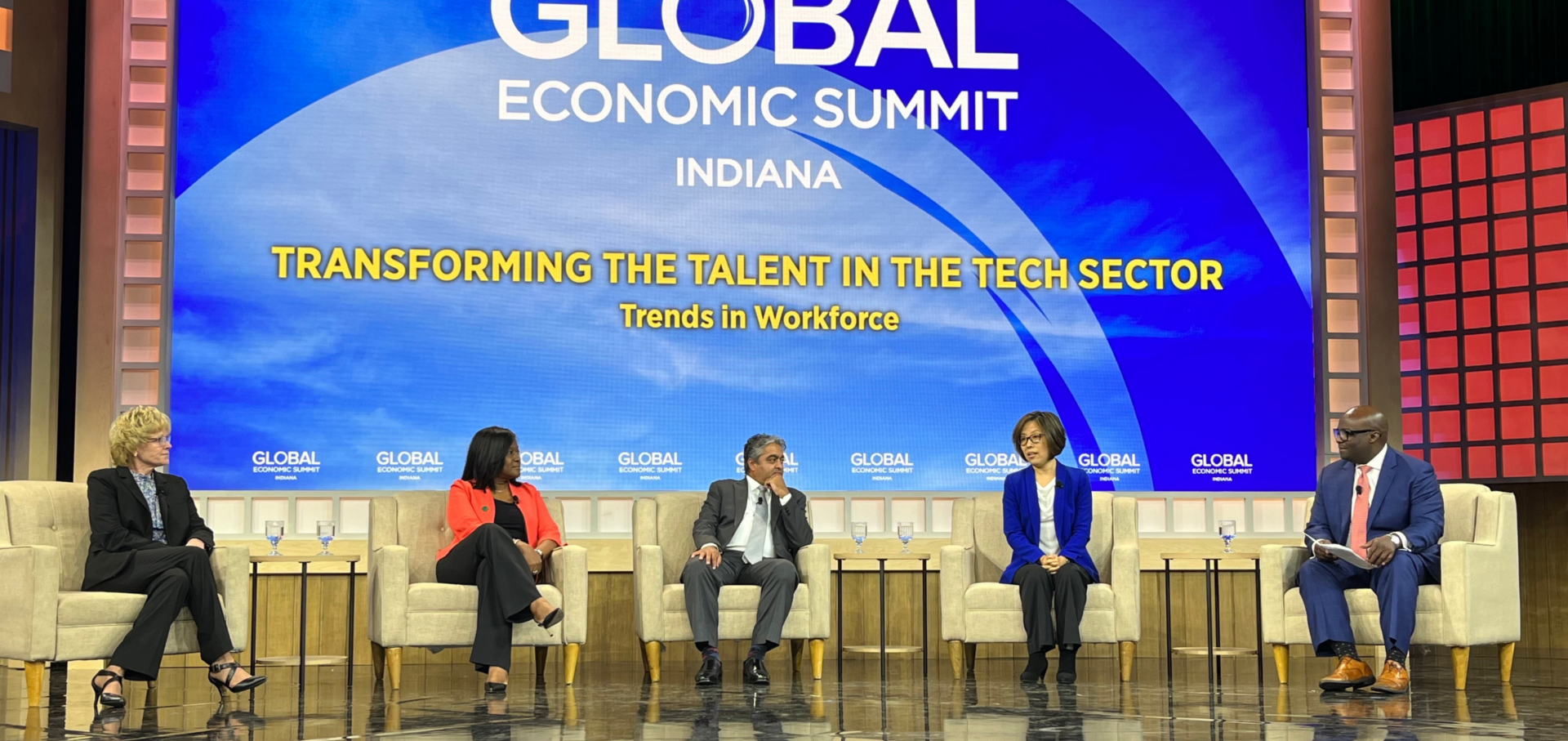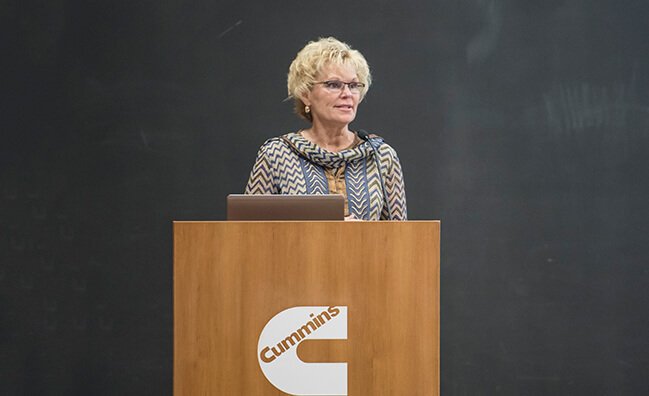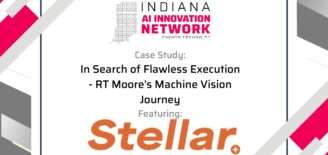Setting the stage for skills-based hiring at IEDC Global Economic Summit
The Indiana Economic Development Corporation threw a huge party in Indianapolis last weekend, and everybody came. Seriously. The Excel spreadsheet of attendees went on for 20 pages. There were ambassadors, consulates general, federal agency heads. The governor. Mayors. Legislators. Company CEOs. University representatives. And if you’ve heard of a global—or local—tech or tech-enabled company, they were also there.
Dignitaries represented Australia, Canada, China, Denmark, France, Great Britain, Germany, Hungary, India, Israel, Japan, Korea, Latvia, Monaco, Myanmar, Portugal, Qatar, Slovakia, Sweden, Switzerland, the Congo, Taipei, Turkey and Ukraine. Anyone with a pinkie in Indiana economic development or business was there for at least part of the four-day Indiana Global Economic Summit (IGES.). The consensus seemed to be that the opportunity to attend the Indy 500 may have tipped the scales for dignitaries to attend, but the networking and content offerings put Indiana in a positive global spotlight.
Networking leads to opportunities and investments
Indiana State Representative Carey Hamilton (HD87) registered for the summit because she thought it might have implications for state policy. But she’s also the vice president for policy and government relations for ClimateView, a Swedish climate action technology company that helps cities transform climate planning into progress and was pleased to find opportunities for both sides of her professional life.
She walked away from the event with interest from an angel investor to support her company and a new international connection and said both aspects of her work benefited from attending IGES.
“As a legislator, I gained invaluable insight as to how governments worldwide are supporting innovation in business, from the move to a low carbon economy, to smart tech and more. In conversations, I was thrilled to learn that IGES wowed attendees as a best-in-class event that highlighted Indiana’s diverse manufacturing sector, growing tech sector and global motorsports leadership,” she said. “As an employee of a global climate tech company, I experienced the unparalleled networking value of bringing together business and Government leaders from 30 countries.”
Transforming talent in the Indiana tech sector
The summit covered more than 20 topics, all designed to showcase Indiana’s potential as a trading partner and location for investment or new facilities. Panel discussions and sessions focused on sustainability; supply chain, enhancing patients’ experiences in healthcare; working with China; green manufacturing; strategies for diversity, equity and inclusion in corporate and academic settings and more.
Relationship Manager Jordan Isaacs, who also serves as the organization’s governmental liaison and chief company hunter, organized much of TechPoint’s IGES participation. “I’m excited to see the expansion and partnership opportunities that come from this event,” he said.
One session focused on transforming talent in the tech sector. Panelists included Cummins Chief Digital Officer and TechPoint Board Chair Sherry Aaholm, Infosys Head of Global Government and Public Affairs Anurag Varma, Microsoft Chief Digital Officer Jacky Wright, TechPoint CEO Ting Gootee and moderator Cordell Carter, executive director of Aspen Institute’s Socrates program.
“The level of change they’re talking about takes a decade to really be embedded in the culture,” said Dennis Trinkle, TechPoint’s executive director of talent pathways and programs. “It’s long past time for this to happen, and it’s encouraging to see the focus by people at this level.”
The changes discussed focused mainly on how to attract and retain tech talent in a globally tight labor market with the added bonus of workers who want to work remotely forever because they can work from wherever they want. Panelists said this means employers must meet workers where they are, provide an environment that doesn’t just offer equitable opportunities for all, but an environment where employees feel they are welcomed and wanted.
Gootee said leading by example is important, and she repeated advice from Winston Churchill to never waste a good crisis. The pandemic was a crisis that has led to employees proving they can work effectively from home and now demanding to be allowed that kind of flexibility.
“We didn’t have enough tech talent in the labor pool to begin with and now they have the power to move anywhere because they’re in such demand,” Gootee said. “The situation has compelled us to create new pathways for talent to feed that pipeline.”
Gesturing to Microsoft’s Wright, Gootee said TechPoint is a bridge builder, working with Microsoft and others to create an adult apprenticeship program to help upskill existing workers in a community wide effort. Collaboration among all the stakeholders is important for effectiveness—companies, educators and trainers, career builders, governmental agencies and workers themselves.
“It takes an ecosystem,” Wright agreed.
Infosys’ Varma said one way his company keeps people is to find appropriate employment for spouses for relocating new recruits. Panelists agreed that to win today’s talent battles, employers must do all they can to ensure workers feel truly welcome and able to grow professionally.
Aaholm said Cummins upskills its workforce to help generate prospective new employees, but often discovers that those workers find other opportunities nearly as soon as they gain their new skills. Cummins has been working with Purdue University to meet young college students early trying to develop relationships so they will be more likely to work at the global manufacturer upon graduation.
But college grads aren’t the only target tech and tech-enabled companies should be lining up, she said. Aaholm is passionate about skills based hiring—the practice of hiring based on credentials, experience and ability rather than diplomas and looking for talent where others might not.
That passion comes from a deep source.
Hiring (and promoting) skilled workers without degrees
Most people in the Indianapolis tech community know Aaholm as a leader. She joined the global manufacturing company as Chief Information Officer (CIO) in 2013. Prior to that, she spent 15 years at FedEx, and left there as the Executive Vice President (EVP) of Information Technology, where she drove the IT transformation strategy for that global enterprise.
Less well known is that Aaholm began her career without a college degree, a comment she casually threw out to the panel and its audience. She later expanded on how she worked her way to the C-suite.
Aaholm was a teenager when complications from diabetes put her father in a wheelchair and her mother, who had an 8th grade education, took over the family’s dairy farm. Aaholm and her siblings helped, too, and her mother ran the farm operation successfully for years before fire destroyed a barn and killed many of the dairy cows. Insurance complications kept the family from immediately rebuilding. Her mother needed a job.
Despite her years as a successful owner/operator of a heavily regulated business, she could only get positions as a line cook or dishwasher. She decided to get her General Educational Diploma, or high school equivalency. Then, Aaholm’s father passed away.
“My mom almost gave up, as you can imagine, but we convinced her to stay in school and helped her out,” Aaholm said of herself and her siblings.
At the same time, Aaholm began working, married and started her own family. She was taking evening college courses, but both job and family obligations kept growing. She completed three years toward an undergraduate degree and stopped, intending to keep climbing the corporate ladder by securing and demonstrating her growing skills and abilities. In her late 30s, Aaholm started applying for VP level positions, eventually getting to the EVP level at FedEx.
To get there, Aaholm said she had to work harder than others – even if she could demonstrate the necessary skill sets. “I commonly ran into a bias from hiring managers that people who went to college had obtained skill sets that people assumed I lacked.”
Understanding how to lead/manage people, software engineering skills, and financial skills were some of the key leadership skills hiring managers felt she couldn’t have accomplished, but she was certain she had.
“As I looked for such a role in the broader market. I hit the recurring comment that I could not get a C-Suite job without a degree. Common feedback was ‘‘what a stellar set of accomplishments you have, but unfortunately you do not have a degree so we cannot hire you,’” she said.
Based on that recurring message and a recruiter’s advice that if she just re-enrolled, opportunities would emerge. He was confident that just that action could propel her upwardly, and he was right.
“Once I did that I had multiple offers,” Aaholm said. “In other words, I got a CIO job without having the degree but I needed to demonstrate that I would have it in a year or so.”
Aaholm didn’t stop with the Bachelor’s in Business Administration with majors in Marketing and Economics that she earned from the University of Wisconsin – a common phenomenon with skills based hiring. She recently was awarded a Master’s of Science in Sustainability from the University of Wisconsin, Green Bay. She has also attended the University of Chicago Graduate School of Business, where she studied Finance for Executives and Strategic Business Leadership.
It shouldn’t be so hard, so let’s change it.
Aaholm says getting jobs and career advancements shouldn’t be so hard for those who have the necessary skills and abilities. She’s not one to avoid a challenge she can help resolve. You can see her fingerprints on many of Cummins’ initiatives to attract those groups, as well as college graduates. Nearly a decade into C-suite leadership, it’s clear that she hasn’t forgotten her own struggle.
“Going back to school after 20 years is not an easy task,” she said, explaining some of the college credits she earned before she went back to complete her degree weren’t accepted, and there was no credit given for her work experience and accomplishments. “This is another area that colleges have to think about for returning students: how do you get credits for work experience/knowledge.”
In addition to encouraging skills-based hiring, Cummins worked with Purdue University to form the Analytix program, headquartered at 16 Tech. Through the program, Cummins pays Purdue for data science work, which gives Cummins leaders the opportunity to see the students in action and consider them for employment based on their performance.
“The program is a year old now, and we have brought two students in to us as full-time employees,” Aaholm said. “We also have a partnership with Ivy Tech where they are teaching cyber skills, and we bring qualified students in as entry level employees.”
Cummins’ RePower program focuses on bringing back to the workforce women who left jobs to take care of their families, but are ready to return to their careers.
“That is a challenge for them, as employers may have a bias that their skills are dated. Cummins sees the opportunity,” Aaholm said.
She was also instrumental in the policy decision at Cummins to remove college degrees in job descriptions for positions that don’t require them to help themselves now as employers across the globe are fighting against a tight labor market that pits them against each other to find and retain talented workers.
Some might argue that Aaholm would have been an inspirational example for skills-based hiring had she accepted the mantra that she would never climb higher than EVP.
But Aaholm had too good a teacher to settle.
Her mother didn’t stop at earning her GED. She went on to get a degree in graphic art design. She is also happily remarried and still living on the family farm.
It seems fitting that Aaholm’s career journey was mentioned at the IGES, which Gootee said “demonstrated that global bridge building can take place in Indiana under strong leadership.”
“Increasing global connectivity is vital to attracting and retaining top talent and entrepreneurs to our community who often wonders what interesting opportunities may exist in markets like Indiana,” she said.
Economic indications show Indiana will be in a constant and global fight for quite some time to prove why the Hoosier state is one where businesses and people can thrive. Events like the IGES and continued expansion, growth and innovation can help showcase the benefits the state offers.
Like qualified people without obvious credentials, those benefits just need to be seen.
The point of the IGES was to bring together leaders and decision-makers who are influencing the future of Indiana’s skilled and advanced workforce. It seems to have worked and expectations are high for news of new collaborations and innovations.
“We don’t just have traction, we’ve got serious momentum going forward,” said Governor Holcomb in an interview with Inside Indiana Business Host Gerry Dick. “The key will continue to be to make sure that we have the workforce skilled up to fill these careers, because success attracts success.”




